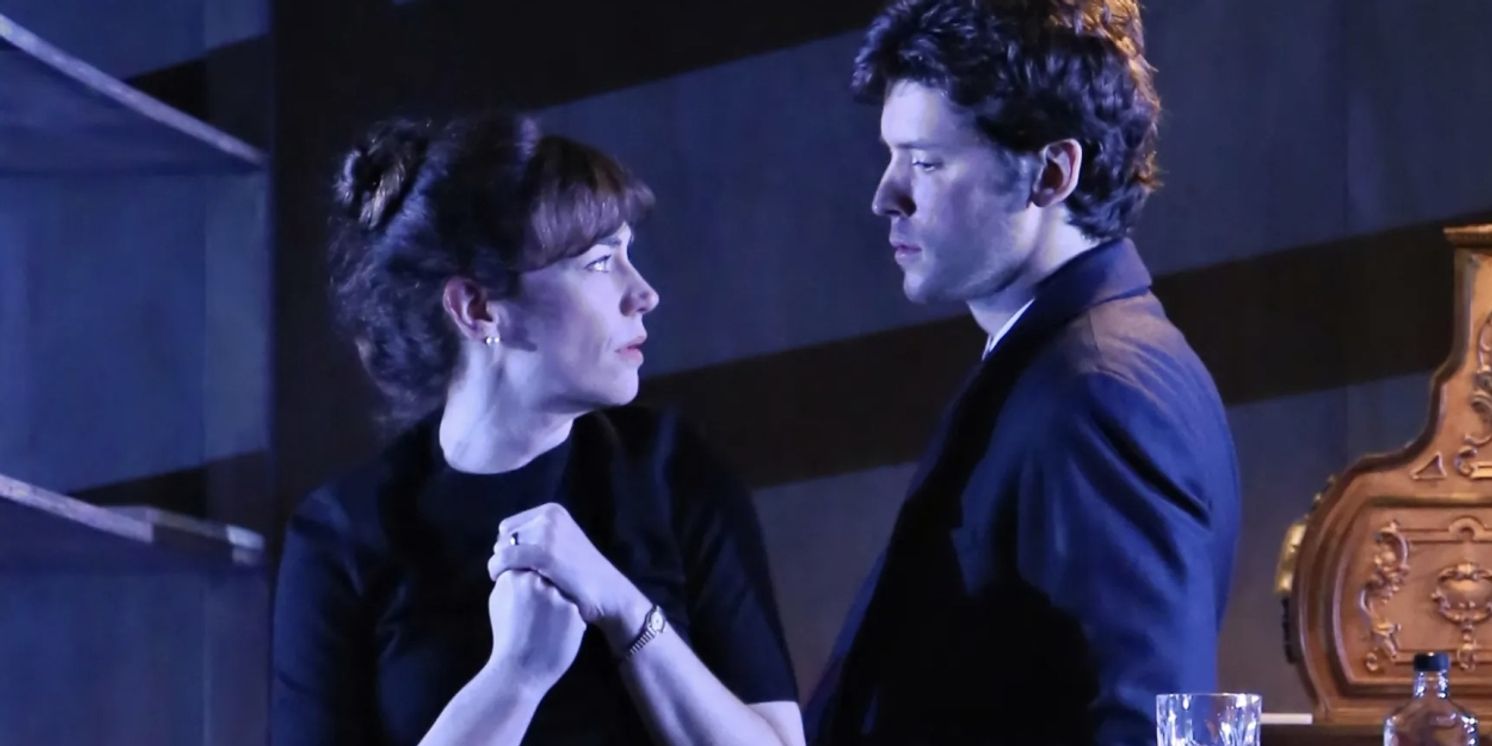Review Roundup: ORPHEUS DESCENDING at Theatre for a New Audience
Orpheus Descending runs through August 6 at Polonsky Shakespeare Center.

Theatre for a New Audience is currently presenting Tennessee Williams and Orpheus Descending- its first production of a play by Tennessee Williams and the final production of TFANA’s 22-23 Season.
Tennessee Williams’ Orpheus Descending tells the story of the passion of two outcasts—Lady Torrance, a storekeeper’s wife and daughter of a murdered Sicilian bootlegger, and Val, a wandering guitar player—and their attempt to escape from a Southern Hell. Set in a small town dry-goods store in the Deep South, Orpheus Descending is a toxic brew of racist violence, bigotry, misogyny, sexual passion, and longing for liberation.
Maggie Siff (Billions, Mad Men, and Sons of Anarchy) plays Lady Torrance and Valentine Xavier, a wandering guitar player, is performed by Pico Alexander (Catch 22, Simon Stephens’ Punk Rock, and A.R. Gurney’s What I Did Last Summer).
Let's see what the critics had to say...
Elisabeth Vincentelli, New York Times: Tonally the production is similarly unmoored. The play alludes to fantastical elements, as with Val’s entrance, which looks as if he had been manifested out of thin air by Uncle Pleasant, a character who is also referred to as “conjure man” (Dathan B. Williams), or when Jabe’s baleful pounding sounds like the emanation of an enraged poltergeist. But Schmidt (“Mac Beth,” the musical “Cyrano” starring Peter Dinklage) does not exploit those opportunities. Also failing to make an impact is the outsize, fascinating character of Carol Cutrere (Julia McDermott), a lost soul who staggers in and out of the play in runny eyeliner, and is a key third outcast in the story.
Tim Teeman, Daily Beast: Maggie Siff as Lady Torrance and Pico Alexander as Valentine/Val Xavier play, variously, a no-nonsense shopkeeper and strange musician-loner who share both an understanding and need to escape the confines of not just the stultifying, deeply racist Southern town they are in, but themselves. It is telling the play in its three acts, takes place in a kind of dusky gloam (David Weiner’s lighting is a design element in its own right); even when the second act is supposed to be in the afternoon, you never feel the warmth or exposure of daylight. Darkness hides, and there is much to hide here.
Elysa Gardner, New York Sun: The small Southern town that’s the setting for Tennessee Williams’s 1957 play “Orpheus Descending” is the kind of place where barking dogs can be heard chasing escaped convicts before ripping them to shreds. It’s a community where men are encouraged to be bigots and bullies, and women who aren’t able to repress their moral and sensual instincts can easily wind up either dissipated, like the self-described exhibitionist and vagrant Carol Cutrere, or disappointed, like Lady Torrance, an Italian immigrant who was married off to an old racist after her bootlegger father was burned alive trying to save his wine garden from the Ku Klux Klan.
David Finkle, New York Stage Review: Orpheus Descending is worth attending, especially for theatergoers devoted to the America’s most poetic 20th-century playwright. But it’s not an ultimately successful play. There are reasons that wouldn’t ordinarily be available because audiences don’t make a habit of attending a play after having boned up on the playwright’s frame of mind while writing the play. Anyone, however, who’s read John Lahr’s definitive biography Tennessee Williams, subtitled “Mad Pilgrimage of the Flesh,” has learned that Williams was in emotional turmoil while getting this one down on paper.
Frank Scheck, New York Stage Review: Williams completists will want to take advantage of this production of the rarely performed work, and it has enough worthwhile elements to make it worth the nearly three-hour investment. But this revival, like the play’s previous incarnations, mainly proves that Orpheus Descending never really works.
Jonathan Mandell, New York Theater: Lady Torrance and Valentine Xavier, two would-be innocents who feel corrupted and brutalized by circumstance, meet on his thirtieth birthday, after he’s spent his youth as a drifter and a sexual hustler. Wearing his snakeskin jacket and carrying his guitar (which he calls his “life companion”), Val has wandered into a small Southern town full of gossips and violent bigots, entering the dry goods store run by Lady, a middle-aged Italian-American with a tragic past and an unhappy marriage with a dying brute. Val asks Lady for a job. She asks him for a reference. He produces a letter from the owner of an auto repair shop, who fired him after three months because, even though he was honest and a real hard worker, he was also “…a peculiar talker and that is the reason I got to let him go.” That is more or less my reaction to Theatre for a New Audience’s revival of “Orpheus Descending,” Tennessee Williams’ rarely-produced 1957 play – hard-working, but just too peculiar.
Photo Credit: Gerry Goodstein
Reader Reviews
Videos

